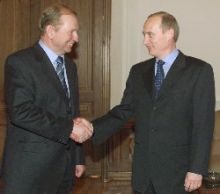The scheduled CIS summit, which ended in Minsk on December 1, was important for Ukraine not so much by Commonwealth related matters — Kyiv does not seem to believe in CIS prospects even on the official level — as by a new gas deal with Russia. Late on the night of November 30, after five hours of tense negotiations, the presidents and premiers of Russia and Ukraine reached an agreement to grant Ukraine a ten year Russian natural gas debt relief. This debt varies between an estimated two to three billion dollars (vs. the $1.362 billion stated by Ukraine earlier, with $700 million of this debt to be included in the amount being restructured). According to Russian Prime Minister Mikhail Kasianov the relief will be offered at a minimal market interest rate. He also reported that from now on half the gas being supplied to Ukraine will be paid for in real money, with payment for the remaining part to be deferred by eight or nine years. All the specific conditions will be drawn up in the immediate future. Mr. Kasianov also expressed confidence that the Ukrainian leadership will not allow unsanctioned pilferage of gas. In his words, Ukraine needs an annual supply of 78 billion cu. m. of gas, of which 18 billion are extracted in Ukraine itself and 30 billion come on contract from Turkmenistan. Russia commits itself to supply the rest. According to Mr. Kasianov, “the parties have reached complete mutual understanding and solved in principle the problem that has tormented over the past year not only these two countries but also the whole international community.”
Prime Minister of Ukraine Viktor Yushchenko declared that Ukraine and Russia will sign five cooperation agreements, including one on settling the gas debt by December 15. As the minister for fuel and energy of Ukraine, Serhiy Yermilov, explained, the document was not signed in Minsk just “for technical reasons.” Incidentally, it is not for the first time that problems are announced to have been solved only after a meeting between the presidents of Ukraine and Russia. And it looks like the two presidents’ deals might again sink in the quagmire of intergovernmental squabbles.
Presidents Leonid Kuchma of Ukraine and Aliaksandr Lukashenka of Belarus agreed to meet again in January 2001 in Chernihiv or Homiel. This was disclosed by Mr. Kuchma himself during the ceremonial opening of a new Ukrainian Embassy building in Minsk. He said in this connection that “Ukraine has come here to stay forever, not just for a long time.” In the Ukrainian President’s words, nothing separates but very much unites Ukraine and Belarus, and relations between the two republics should be as grandiose as the new embassy building.
The summit adopted a provision on the Antiterrorist Center, which Ukraine signed with reservations; a protocol on the inventory of multilateral treaties concluded within the CIS framework; a list of the now invalid decisions of the Heads of State Council; information on the progress of free trade area formation, as well as on the performance in 2000 of the CIS-sponsored Abkhazia Conflict- Settling Task Force. The presidents also made a joint statement on the Chornobyl Nuclear Power Plant (CNPP) closure, in which they called on the world community to support Ukraine in its aspiration to fulfill obligations to shut down the CNPP and turn the Shelter over power unit four into an environmentally friendly system. The world community was urged to fully and timely meet its CNPP closure related obligations and continue rendering the aid to Belarus, Russia and Ukraine as states that suffered most in the disaster. Incidentally, the presidents and prime ministers of Russia and Belarus accepted Mr. Kuchma’s invitation to attend the CNPP closure ceremony on December 15. In his turn, Prime Minister Vladimir Yeroshin of Belarus suggested to Mr. Yushchenko that they consider taking a joint stand on participation in the European energy program. Moscow’s representatives did not voice their attitude to this during the summit, only saying that laying a gas pipeline bypassing Ukraine is in the interests of Europe’s energy security.
The summit also heard another death sentence on the CIS: Mr. Kuchma, commenting on the Russian decision to impose a visa regime on Georgia from December 5, said that “if a visa regime is being imposed within the Commonwealth limits, the CIS is no longer needed.” To tell the truth, the Commonwealth has not been referred to as a single entity for several years. It must be also symptomatic that the Turkmenbashi has not been attending the latest summits at all.
It was proposed to hold the next CIS summit on March 16 again in Minsk, once proclaimed the Commonwealth’s capital.







